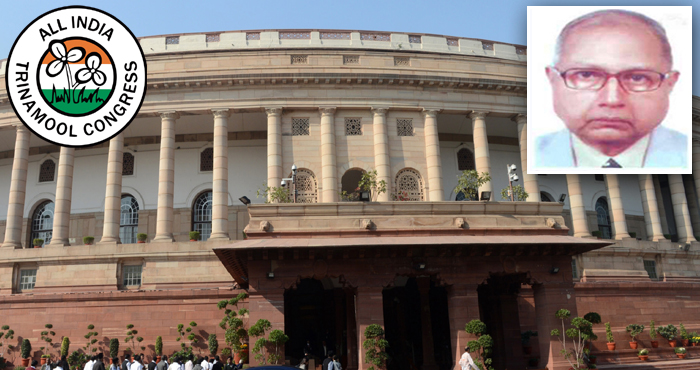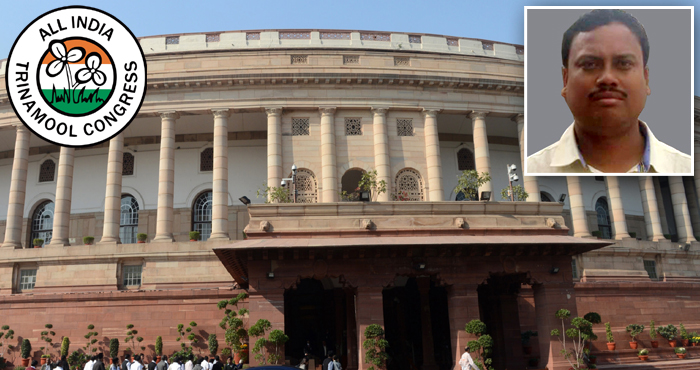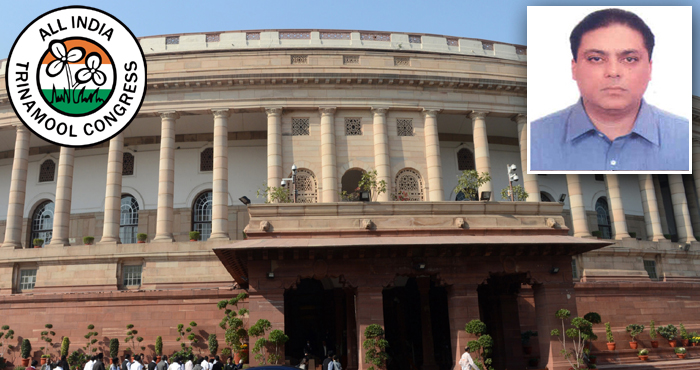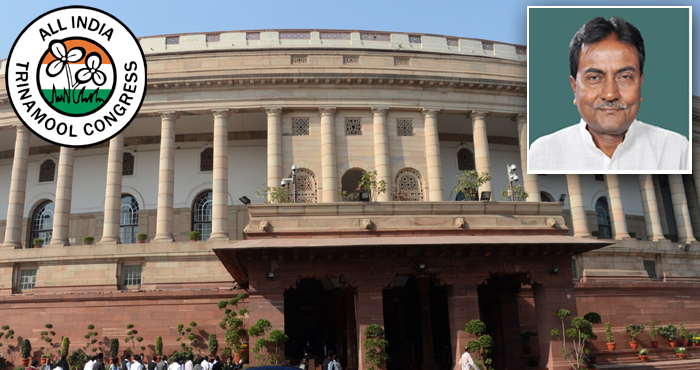FULL TRANSCRIPT
There is a shortage of mine-protected vehicles. Why doesn’t the government import the vehicles for the time being and make up the shortage so that our jawans do not lose their lives because of unprotected vehicles?

FULL TRANSCRIPT
There is a shortage of mine-protected vehicles. Why doesn’t the government import the vehicles for the time being and make up the shortage so that our jawans do not lose their lives because of unprotected vehicles?

FULL TRANSCRIPT
The BSNL network is poor not only in LWE areas, but in almost every State of the country, specially in rural and border areas, including my constituency Cooch Behar. In this online age, day to day work both in public and private sector (specially in banking sector, education sector and various online services like salary submission, scholarship and other activities) are hampered due to poor network of BSNL. And there is a common tendency to use other networks instead of BSNL.
My question, through you, to the Minister is what is the government’s initiative to provide smooth and secured BSNL network throughout the country, specially in rural and border areas.
The Ministry of Human Resources Development is going to launch a new e-based education system. For the success of this programme the online network should be ensured in the rural areas. What is the government’s initiative in this regard?

FULL TRANSCRIPT
The HIV and AIDS (Prevention and Control) Bill aims to provide essential support to national AIDS control programme arresting new infection and thereby achieving the target of ending the epidemic by 2030 according to the sustainable development goals.
India has the third largest HIV epidemic in the world after South Africa and Nigeria.
As per the report of 2015, there are 21.17 lakh persons estimated to be living with HIV in India, out of which 6.54 percent accounts for children. The adult prevalence is in the range of 0.3 percent of which around 40 percent is women and estimated 48 thousand population died from AIDS related instances in 2015. However, at present India’s HIV epidemic is slowing down. In 2015, 44 percent of adult were eligible for antiretroviral treatment (ART) rising from 36 percent in 2013.
Despite the rise, in the number of people on ART remain slow. The introduction of new 2013 World Health Organisation treatment guideline has more people eligible for antiretroviral treatment. Focussing treatment at patients is to be the priority area.
The Bill highlights the provisions to safeguard the rights of the people living with HIV and affected by HIV. It also lists various grounds on which discriminations against HIV positive persons and those living with them is prohibited.
These include the denial, termination, discontinuation or unfair treatment with regards to employment, educational establishment, healthcare services, residing and renting property, standing for public and private office and provision of insurance. The requirement for HIV testing as requisite for obtaining employment or accessing healthcare is also prohibited. The Bill seeks to provide legislative framework of the existing state of non-discrimination against people living with HIV and AIDS.
Alongside, the aim is also to enhance the legal accountability and establish formal mechanism for the grievances. Under this Bill, every HIV infected or affected person below the age of 18 has the right to reside in shared household and enjoy the facilities of household. The Bill prohibits any individual from publishing information and advocating feeling of hatred against HIV positive persons and those living with them. The Bill provides for the guardianship of minors. The Bill requires that no person shall be compelled to disclose his HIV status, except with the informed consent and if required, by a court order.
According to the Bill, the Central and State Governments should undertake measures to
The Bill makes the provision for the appointment of an ombudsman by the State Government. Cases relating to HIV positive persons shall be disposed off. Most of the recommendations made by the Standing Committee on Health and Family Welfare were undertaken into the Bill. Some amendments were suggested during the discussion in the Rajya Sabha. Medically advised safeguards and precautions should be adopted to minimise the risks of infection from HIV positive persons, which shall not amount to discrimination. Central and State Government should formulate schemes to address the needs of all protected people under the Bill as opposed to only the HIV and AIDS-affected women and children. In the case of an emergency, the ombudsman will pass an order within 24 hours; otherwise the ombudsman shall pass an order within a period of 30 days.
The Bill, in a way, is a landmark Bill as it extends the first-ever explicit legal endorsement in the case of a specific health condition, for people living with HIV and AIDS in our country. There cannot be two opinions about the exalted aims of the Bill. However, while the Bill and the amendments take important steps in the struggle of tackling HIV and AIDS, there are certain limitations which create further gaps in catering to the main aims of the Bill. The Bill brings a rights-based approach to AIDS treatment, making it imperative for both Central and State Governments to provide treatment as far as possible.
Number one, under Section 14 (10), though the Bill lays down that treatment is the right of the patient, it restricts its reach to convert it into a legal right. Thus a person with HIV and AIDS denied treatment cannot generally initiate any legal proceedings against government authorities.
Number two, the prevention programme does not look at how women’s bodies are different from men. Sexual violence heightens the risk of HIV transmission and infection, travelling from mother to child during pregnancy or breast-feeding. These are factors that deserve more attention.
A UNICEF report says that only 23% of pregnant women living with HIV undertook antiretroviral treatment in 2009 because of factors like social customs and family restriction. Even its report in 2015 highlights that 39.5% of HIV infected adults in India were women and that this was a growing proportion. While two years ago, it was reported that HIV prevalence for women who inject drugs is almost double than that of men.
The Bill fails to include provisions for the protection of people who are most vulnerable to contracting the disease, for instance, people frequently using contaminated injection equipments. Under Section 2 of the Bill, definition should have included vulnerable people. What is known as the most at risk population? We should include transgender women, men who have sex with men, female sex workers, people who inject drugs. Also proposed is the deletion of Clause 22 which relates to the strategies for reduction of risk of HIV transmission is needed as it protects the legality of the needle, syringe exchange.
Civil courts have the rights to fully address the employment and discrimination only in public sector. It is important that courts should be conferred power to address discrimination in private sector as well as to make it inclusive and effective.
The Bill does not illuminate on the legal dissonance between the provisions of non discriminations and other acts and case laws that discriminates against sex workers, homosexuals and transgenders.
In conclusion Sir, stigma attached to HIV-AIDS victims in India remains intense despite ongoing efforts of the government. The stigma is not only confined to social obstacle but, economic too. With the advent of the Bill, the first step has been initiated to stop the spread of disease and help those who have been infected by HIV, and AIDS, through ART.
Even if it can not do away with the stigma, the law offers a clear legal course also to successfully eradicate HIV and AIDS by 2030. The process would require a high degree of commitment and thus would equally require us to address the shortcomings. We should fill up the gaps and ensure a far-reaching impact of the Bill.
At the end Sir, I would like to mention what has been done by our West Bengal Chief Minister Mamata Banerjee. She has initiated a programme called Muktir Aalo for the sex workers, which includes skill development and vocational training.
Thank you Sir.

FULL TRANSCRIPT
Sir, West Bengal has inherited a huge debt burden after 34 years of CPI(M) misrule, before All India Trinamool Congress came to power. Sir, we have repeatedly requested the Centre to waive or restructure the loans.
When Shri Pranab Mukherjee, who was the Finance Minister in 2011, had understood the plight of the State and had allocated a package worth Rs 8,750 crore to develop 11 districts under BRGF. Under this scheme, the Centre still owes our State Rs 2,330 crore. The totally money that the Centre still owes to Bengal is Rs 10,469 crore. Even at the 11th Inter-State Council meeting, which happened in the National Capital last year, our Chief Minister had expressed that there ought to be <interruptions>
We feel, Sir, we are being discriminated against. Despite having 88 fast-track courts we are not getting any money but Gujarat, which has no such courts, has been given Rs 400 crore.
It is imperative that the concept of Special Category Status for States be continued. It is not only Bengal, other States like Punjab, Maharashtra and Jharkhand are also debt-stressed. The Centre must also release the funds at the earliest for the development of backward regions.
I would like to end with two lines, Sir:
Dusron par agar tapsara kijiye
Saamne aaina rakh liya kijiye.
Thank you, Sir.

FULL TRANSCRIPT
Sir, Cooch Behar district, my constituency, is 52% SC, 27% Muslim-minority populated. At the same time it is economically backward region; it is an agri-based district. There are no major industries.
Almost 3 lakh people who go to different States as labourers every year. Per capita credit and deposits are also not satisfactory in comparison to national average.
Under these circumstances, I demand that Cooch Behar district be included under the BRGF scheme.
Thank you, Sir.

FULL TRANSCRIPT
Sir, stadiums are an emotive issue in all the States, especially in the rural areas. I wanted to know from the Hon. Minister whether the new scheme that the Sports Ministry has taken up, Khelo India, includes stadiums and what is the budgetary outlay.

FULL TRANSCRIPT
It is very unfortunate that Central Government is preparing a cabinet note recommending for closure of several CPSUs of the country . NITI Aayog is preparing a roadmap for ailing public sector undertakings.and had earlier identified 26 sick Central Public Sector Enterprises (CPSEs) for closure, of which 7 received cabinet nod. These include Hindustan Cable, Tyre corporation, HMT Watches, Birds Jute and Export Limited (BJEL) and Central Inland Water Transport Corporation. It is very unfortunate that Niti Aayog has also identified 12 more CPSEs for strategic sale. whereas the Central Public Sector Enterprises (CPSEs) are meant to serve certain larger social causes.
117 years old Country’s first Pharmaceutical company Bengal Chemicals & Pharmaceuticals Works Ltd. is one of the prime listed of the Government to sale. Bridge and Roof Company who is on average profit of Rs 32.83 crore since last 6 years is also in the target of strategic disinvestment . Most surprisingly, special steel plant unit Alloy Steel Plant, the first Indian producer who adds muscle to the “Make in India” campaign for indigenous production of speciality products to meet defence needs are also in process of Strategic Sale plan of the Government. The fact is that all these three are from West Bengal.
Bridge & Roof Co. (I) Ltd . is serving the construction industry for more than ninety seven years with enviable track record in making profit years together, paying dividend to Government of India & never been fallen sick with constant positive growth with 1500+ permanent employees & 15000 + temporary employees & workers posted all over INDIA . Whereas Hindustan Newsprints is also a profitable and regular paying dividend in the central exchequer since last few years with a continuous profit of average Rs 9.24 crore since 2010.
Keeping in mind the necessity of the existence of Central Public Sector Organisations for addressing social causes and tremendous scope of direct and indirect employment dependency, I request the Central Government, the Finance Ministry to close the decision to close down the Public Sector Organisations of the country better to think for revival/restructure by conducting a well-organised comprehensive research study to identify the areas of business, where these units can successfully/profitably operate and grow.
In conclusion, I request the Government that there are still tremendous potential of industry in West Bengal, please do not ruin the ‘RHUR’ of Asia but make Bengal another gateway of Industrial renaissance.
আমি কেন্দ্রীয় সরকার ও মন্ত্রীদের অনুরোধ করব পশ্চিমবাংলা – যেখানে ঠাকুর শ্রী শ্রী রামকৃষ্ণ পরমহংসদেব জন্মগ্রহণ করেছেন, যেখানে স্বামী বিবেকানন্দ জন্মগ্রহণ করেছেন, যেখানে আশুতোষ মুখোপাধ্যায়ের মতো মানুষ জন্মগ্রহণ করেছেন – সেখানে বঞ্চনা যাতে দয়া করে না হয়।
I kindly request the Centre through you, Sir. Thank you.

FULL TRANSCRIPT
ধন্যবাদ স্যার আমাকে সুযোগ দেওয়ার জন্য।
আমার ঘাটাল লোকসভা কেন্দ্রে খড়গপুর সাউথ ইস্টার্ন রেলওয়ে ডিভিশন পড়ে। সেখানে ডেবরা ব্লকে বালিচকে একটা রেলওয়ে ওভার ব্রিজ হওয়ার দরকার ছিল গত ৪ বছর ধরে।
ব্রিজটা না হওয়ায় ৬টি ব্লকের লক্ষ লক্ষ মানুষের অসুবিধা হচ্ছে, কারণ তার পাশে স্কুল-কলেজ-হাসপাতাল ইত্যাদি অনেক কিছু রয়েছে। রাস্তায় প্রচুর জ্যাম হয়। ট্রাফিকের জন্য রোগীরা সময়মতো হাসপাতালে পৌঁছতে পারেন না। আমি আপনার মাধ্যমে, ডেবরা ব্লকের সমস্ত মানুষের অনুরোধ মাননীয় রেলওয়ে মন্ত্রীকে জানাতে চাই যে একটা রেলওয়ে ওভার ব্রিজ হওয়া খুব দরকার।
ধন্যবাদ।
Translation:
Thank you Sir for giving me the opportunity to speak.
Kharagpur South-Eastern Railway Division falls under my constituency Ghatal. There has been a demand to build a railway overbridge at Balichak (in Debra block) for the last four years.
Lakhs of people in 6 blocks are suffering because of the lack of a railway overbridge. There are many schools, colleges and hospitals in the area. Traffic is congested. Patients often do not reach hospitals on time.
Through you, Sir, I want to request the Hon. Railway Minister to build a railway overbridge in the area.
Thank you so much.

FULL TRANSCRIPT
Madam, I join the other Members in condemning the order by a military court in Pakistan, the death sentence of Kulbhusan Jadhav. Since the Pakistan Government did not and was not able to prosecute him in normal court, his trial was held secretly in a military court. So far, Pakistan has not produced any proof of his involvement in any espionage activity. In fact, it is said that he was arrested from Tehran, which has no connection to Pakistan.
Kulbhusan Jadhav was a former Navy commando, who had retired and was in legitimate business in Iran. If he would be involved in espionage activities, he would not be having an Indian passport, as he was carrying. We condemn this attitude of the Pakistan authorities.
We are happy that the Foreign Secretary Mr Jaishankar had issued a démarche
to Pakistan and had totally criticised the very wrong step by the Pakistani authorities. This shows that Pakistan, which harbours so many terrorists – like Hafiz Saeed of Jama’at-ud-Da’wah, Masood Azhar, who was released from India – is taking vindictive action against India. The Indian Government has held back release of some Pakistani prisoners on this ground.
The Government must realize that the whole country is behind it and criticising Pakistan.

FULL TRANSCRIPT
The Minister today declared on the floor of the House, “no one from the poor would be denied their rights”. This is good. That’s why we had this discussion as a responsible Opposition: we needed to hear this from the Government, because the signals for the last one month were different; and since you said this on the floor of the House, we respect that and we appreciate that.
I have two clarifications. Since the officials and everybody are here, and you took up the case of MS Dhoni (all good luck to Dhoni that his case got solved), here are my questions.
On February 17, a website had leaked the Aadhaar demographic data of 5 lakh minors. Such people could be children between the ages of six and 14 or women rescued from trafficking or even disabled citizens. I bring this to your notice with all responsibility. If you protected Dhoni, please also protect these people who don’t have the celebrity status of Dhoni; these were five lakh minors. There were others such data leaks which happened too.
You talked about biometrics and demographics and you gave us the difference between the two; we are all aware of the difference between the two. By the way, this was not biometric data that as leaked, this was demographic data that was leaked.
My second question is, you’ve given us the number of people linked with Aadhaar and those are good numbers that you have already linked with Aadhaar. But my question is, after somebody has an Aadhaar Card, how will you bring those numbers down of people who do not get the benefits of MNREGA, of PDS or of ICDS because of other reasons that we pointed out today – in the cases where the Aadhaar Cards don’t work because of biometrics, because of slow connections and because of other reasons. My clarification to the Minister is, how will you ensure that those numbers come down? Now it’s about 40 to 45 per cent, who, in spite of the cards, are not getting the benefits.